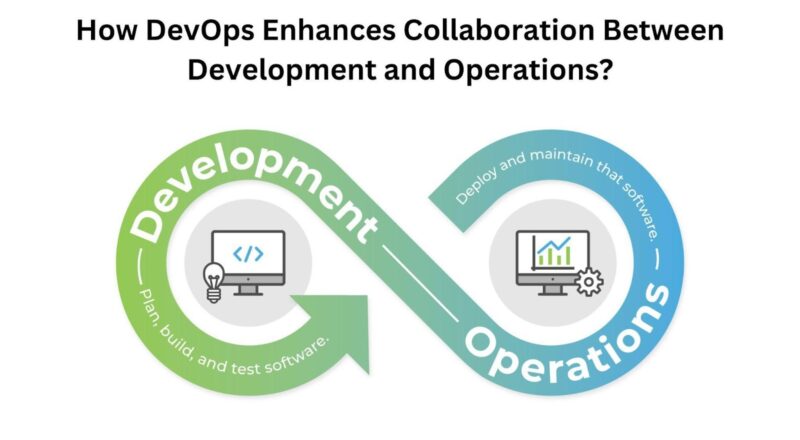Software development and deployment are intricate but essential business operations that focus on providing quality products and services. However, software-as-a-service emerged as a concept that held the global IT industry together during the digital boom. Professionals focusing on software development and deployment keep companies at the forefront of the IT industry by optimizing workflows and fostering innovation and productivity. DevOps practices break down silos between development and operations, while cloud infrastructure provides a shared playground where they can seamlessly collaborate and innovate. You will gain insight into the function of DevOps in contemporary software development and how it enhances inter-team cooperation by reading this blog.
The Role of DevOps in Software Development
DevOps solutions are critical to contemporary software development because they encourage efficiency, automation, and collaboration throughout the software delivery lifecycle. By breaking down the traditional silos between the development and operations teams, it promotes healthy communication between them. Custom AI Development streamlines DevOps pipelines, empowering teams to collaborate seamlessly and predict potential issues before they disrupt deployment. The DevOps methodologies, Continuous Integration, and Continuous Delivery ensure that code changes are promptly integrated, tested, and released, enhancing code quality and cutting down on time to market. DevOps is fundamentally about automation; it minimizes the chance of human error and streamlines repetitive operations. Applications are ensured to operate correctly by real-time monitoring and feedback, but Infrastructure as Code (IaC) makes infrastructure administration easier.
Understanding The Pillars of DevOps
The three primary pillars of DevOps are automation, culture transformation, and cooperation. Automation, or using tools and techniques to automate repetitive operations in software development, testing, and deployment, is the core element of DevOps. Reliability and productivity rise as a result. Collaboration creates solid working ties between development and operations, allowing cross-functional teams to pursue shared objectives and enhance communication. The DevOps movement is a cultural movement that prioritizes trust, shared ownership, and a commitment to ongoing improvement.
Automation
Automation is the foundation of DevOps. Automating infrastructure provisioning, testing, and deployment enables standardized, repeatable processes.
Monitoring & Feedback
As DevOps emphasizes, continuous monitoring and feedback loops are crucial for promptly identifying problems and areas for improvement.
Continuous Integration
As part of continuous integration, code updates are merged into a single repository multiple times daily. This method aids in problem identification and resolution early in the development cycle.
Continuous Deployment
CD builds on Continuous Integration by automating code release and deployment to production. Releases consequently became more consistent and swifter.
Culture & Collaboration
DevOps cultivates a culture of shared ownership and collaboration between the development and operations teams. Communication and empathy are crucial elements of this cultural transformation.
Read: What are the Advantages of Cloud-Based Software?
The DevOps Approach: Best Practices
The DevOps approach, defined by best practices, aims to foster a culture of collaboration, automation, and continuous improvement across software development and IT operations teams. These approaches include automation of manual tasks, continuous integration and delivery, infrastructure as code, microservices, and a strong emphasis on monitoring and feedback. Optimize employee training by blending technical DevOps skills with collaboration workshops to create seamless, shared ownership across development and operations teams. Version control, self-service environments, and continuous integration/delivery pipelines ensure consistency and efficiency while security is embedded into the development process.
Cross Team Collaboration
According to DevOps, the development and operations teams should work closely together. It breaks down organizational barriers and promotes cross-functional teams by fostering a culture of respect and shared goals. This collaboration is required for the software delivery process to be optimized.
Automation Everywhere
Automation forms the basis of DevOps. This involves, among other repetitious and tedious tasks, automating code integration, testing, and deployment. Automation reduces the chance of human error, expedites development cycles, and guarantees consistency in the deployment process.
Infrastructure as a Code
Infrastructure as a code (IaC) defines and delivers infrastructure using automation tools and code. This technique makes infrastructure more manageable, scalable, and reproducible. Versioning applies to infrastructure changes as well as code upgrades.
Microservices & Containerization
DevOps promotes containerization technologies like Docker and microservices. The microservices architecture splits apps into smaller, loosely coupled components, and containers provide a consistent, portable app environment. These techniques enhance scalability, agility, and resource efficiency.
Security as Code
Security procedures are incorporated into the DevOps workflow. This includes code analysis, vulnerability scanning, and security testing. Security is no longer a stand-alone problem but an essential part of the development and deployment.
Cultural Shift
More than just a collection of tools and procedures, DevOps is a cultural revolution. Encourage a culture of mutual trust, accountability, and continual improvement. Teams put collaboration above individual achievement and work together to achieve common goals.
Conclusion
The software development paradigm has shifted with the advent of DevOps, which enhances communication between the development and operations teams. It reduces expenses and hazards while improving quality, speed, and agility. Businesses that automate tasks, implement CI/CD pipelines, and foster a collaborative culture may fully leverage DevOps. The potential of DevOps can be significantly enhanced with the help of consulting services. In today’s rapidly growing digital market, DevOps is no longer only a competitive advantage—instead, it’s increasingly essential to stay ahead of the software development curve.
Companies look for DevOps consulting services to traverse this dynamic environment and implement DevOps best practices successfully. Adopt DevOps to enable your teams, provide superior software, and satisfy contemporary market expectations.
